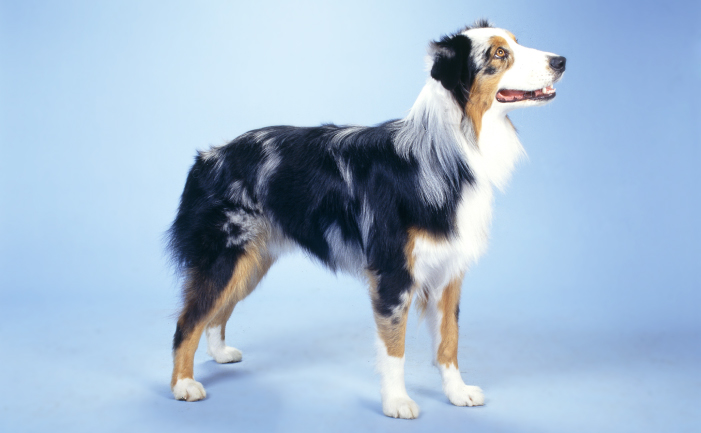Breed: Australian Shepherd
Temperament: biddable, active
Lifespan: 12-14 years
Recommended for: acreages, active families & agility enthusiasts
Dumpage rate: low
Popularity: increasing
Ranking: 118 out of 174
Maintenance: medium
Appearance
The Australian Shepherd (known at ‘Aussies’) is a medium-sized dog, slightly larger than a Border Collie, which has a wavy coat. Adult males stand at 50 to 57.5 cm (20-23″) and females at 45 to 52.5 cm (18-21″). A range of colours is available, including blue merle, red merle, solid black and solid red, and variations with white and a copper trim. (Merle is a coat colour due to a dominant colour pattern factor distinguished by the presence of irregular dark blotches against a lighter background of the same general basic pigment. Merle is usually applied to long coated breeds, an exception being the smooth coated collie. The most common type of merle is blue merle – black patches or streaks on a blue-grey background).
The breed standard allows for blue eyes, or one blue and one brown eye, or marbled eyes in the red merle and blue merle varieties. Up to 25% of the nose may be unpigmented, and tails can be either natural or docked. In the United States some Australian Shepherds are known to be born with bobtails.
Temperament
Breeders say ‘Aussies’ have excellent temperaments which make them popular as a family pet, or an obedience or agility dog. They tend to bond with one person.
In the US, the Australian Shepherd is mainly considered a working dog with strong herding and guarding skills. More than half of the Australian Shepherds in the US are used as working dogs. They are also used for acting, police work, at rodeos and as guide dogs.
Health and lifespan
Australian Shepherds usually live between 12 and 14 years, and enjoy good health. Responsible breeders screen their animals for hip dysplasia.
Grooming
The coat is easy to maintain, grooming once a fortnight for about five minutes, occasional bathing when necessary. However, during seasonal changes when hair is prone to matting they require more grooming. Ensure there is no matting of hair behind the ears and between the toes.
Breeding
Merle to merle matings are not recommended as they can produce white pups, which can suffer deafness, blindness or both. Of all live pups born from merle to merle matings, approximately 25% are born with these problems and need to be put down. In fact the same number of merle puppies appear in a litter by mating merle to non-merle and these don’t have problems. Natural bobtailed animals can produce pups that do not have an anus, a fatal genetic fault.
Australian Shepherds usually whelp without problems and due to their rarity in Australia, pups sell for about $1000-$2000 each. But Australian National Kennel figures show registrations of Australian Shepherds is increasing.
Housepet potential, space and exercise
Pups can be destructive until they are about eight months old. The Australian Shepherd is an intelligent breed, and is responsive to training. They thrive on the mental stimulation that agility circuits provide, but it is important to start training early.
Australian Shepherds do not have a problem with housetraining, and breeders claim that they can live comfortably indoors or outdoors. However, as they are an active breed, a backyard fence will need to be at least 1.2 m (4′) high.
Breeders say it is vital an Australian Shepherd has at least 30 to 60 minutes daily exercise.
Ideal owner
Australian Shepherds are well suited to families with active children, or young couples or singles who have the time to go for a run with their pet.
History
The origin of the Australian Shepherd is uncertain although it is incorrectly claimed to have been bred from working dogs brought to Australia by Basque Shepherds in the late 1800s. It is also claimed to be bred from German Coolies in Australia. When Australian sheep were exported to North America in the early 20th century Basque shepherds and their dogs are said to have gone with them. ‘Aussies’ have been a popular dog in the US for agility and obedience enthusiasts for many years, but the breed is really misnamed: there is no evidence to support the suggestion that the dogs originated in Australia and plenty of evidence to prove that the Basques did not accompany any sheep from Australia. The breed was introduced to Australia in 1990 and was recognised as a breed in 1993.
Further information
To find up-to-date contacts for breeders, contact the following organisations.
The Australian National Kennel Council (ANKC)
www.ankc.org.au
Dogs NSW
http://www.dogsnsw.org.au/breeders-directory
Email: [email protected]
Phone: 1300 728 022 (NSW only) or (02) 9834 3022
Fax: (02) 9834 3872
Dogs Victoria
http://www.vca.org.au
Email: [email protected]
Phone: (03) 9788 2500
Fax: (03) 9788 2599
Dogs ACT
http://www.actca.asn.au
Email: [email protected]
Phone: (02) 6241 4404 – Fax: (02) 6241 1129.
Dogs West
http://www.cawa.asn.au
Email: [email protected]
Phone: (08) 9455 1188
Fax: (08) 9455 1190
Dogs SA
http://dogssa.com.au
Phone: (08) 8349 4797
Canine Control Council of Queensland
http://www.cccq.org.au
Email: [email protected]
Phone: (07) 3252 2661
Fax: (07) 3252 3864
Tasmanian Canine Association
http://www.tasdogs.com
Email: [email protected]
Phone: (03) 6272 9443
Fax: (03) 6273 0844
Dogs NT
http://www.territorydogworld.com
Email: [email protected]
Phone: (08) 8984 3570
Fax: (08) 8984 3409
The Australian National Kennel Council (ANKC)
www.ankc.org.au
Dogs NSW
http://www.dogsnsw.org.au/breeders-directory
Email: [email protected]
Phone: 1300 728 022 (NSW only) or (02) 9834 3022
Fax: (02) 9834 3872
Dogs Victoria
http://www.vca.org.au
Email: [email protected]
Phone: (03) 9788 2500
Fax: (03) 9788 2599
Dogs ACT
http://www.actca.asn.au
Email: [email protected]
Phone: (02) 6241 4404 – Fax: (02) 6241 1129.
Dogs West
http://www.cawa.asn.au
Email: [email protected]
Phone: (08) 9455 1188
Fax: (08) 9455 1190
Dogs SA
http://dogssa.com.au
Phone: (08) 8349 4797
Canine Control Council of Queensland
http://www.cccq.org.au
Email: [email protected]
Phone: (07) 3252 2661
Fax: (07) 3252 3864
Tasmanian Canine Association
http://www.tasdogs.com
Email: [email protected]
Phone: (03) 6272 9443
Fax: (03) 6273 0844
Dogs NT
http://www.territorydogworld.com
Email: [email protected]
Phone: (08) 8984 3570
Fax: (08) 8984 3409



